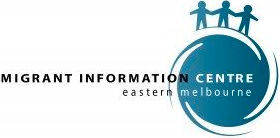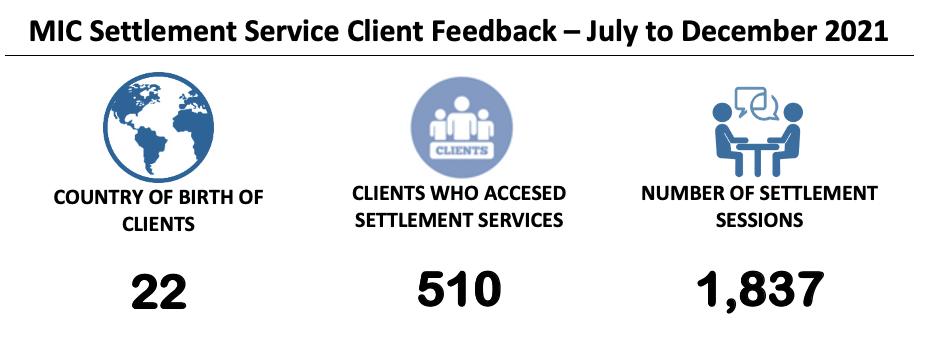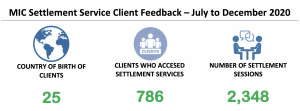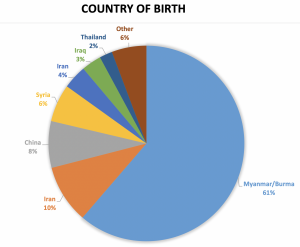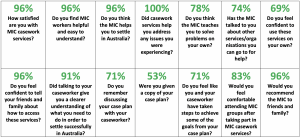MIC Settlement Services Client Feedback
July 2023 to June 2024
The Settlement Engagement and Transition Support (SETS) program undertaken by Migrant Information Centre (Eastern Melbourne) (MIC) supported a total of 2,181 clients from 32 different countries in the 2023/2024 financial year. 871 clients across 3,831 casework sessions were supported in with one-to-one casework, with 1,052 referrals made. A total of 1,310 clients participated in the 253 group program activities delivered across 547 activity sessions. MIC collaborated and partnered with over 40 different services and agencies from across community, health, emergency services and other sectors to effectively deliver SETS activities.

Services and Group Programs – Satisfaction Rating
MIC conducted evaluations across all programs and services delivered in the 2023/2024 financial year. The satisfaction rate across all programs was collated, indicating an average satisfaction of 99% with 1,735 people providing feedback.

MIC Settlement Services Client Feedback
July 2022 to June 2023
The Migrant Information Centre (Eastern Melbourne) (MIC) obtains feedback from clients participating in all SETS client services, including casework, group programs and activities to measure whether the service is meeting client needs, achieving the outcomes and objectives of each program and to identify areas of improvement and service planning to better meet client needs in the future.

The Migrant Information Centre (Eastern Melbourne) provided settlement support for 778 clients across 4,261 sessions during the period of July 1st 2022 to June 30th 2023. Clients came from 25 different countries of birth with the graph below displaying the top countries.

Within the reporting period 73% of clients came from Myanmar/Burma with clients from Iran (12%) and China (9%) make the top 3 largest communities.
All MIC Settlement Program clients are offered the opportunity to provide feedback on the services they received from the MIC at the time of the service. In addition to this the MIC conducts a telephone survey of a number of clients who have accessed settlement services in the previous six months. Below are the results of the client survey.
Services and Group Programs – Satisfaction Rating
MIC conducted evaluations across all programs and services delivered in the financial year 2022/2023. The satisfaction rate across all programs was collated, indicating an average satisfaction of 99% with 1,282 people providing feedback. Children were not asked to complete feedback forms for children’s holiday programs, however, verbal, and anecdotal feedback from children who attended was overwhelmingly positive.

Casework & Referrals
MIC assisted a total of 778 clients with SETS casework support across 4,261 sessions; 721 were low intensity clients and 165 medium intensity clients. A total of 458 referrals were made: 376 external and 82 internal referrals.

Low Intensity Casework
Clients requiring low intensity casework support generally present with the knowledge and skills required to settle into their new community with minimal assistance. MIC assisted a total of 721 low intensity clients across 3,153 casework sessions. 89% of clients indicated their casework support helped them settle in Australia with 92% stating their caseworker gave them a better understanding of what they needed to do to resolve their issues. A total of 91% of clients stated the casework support addressed the issues they were experiencing with 70% indicating the support taught them how to solve problems on their own.
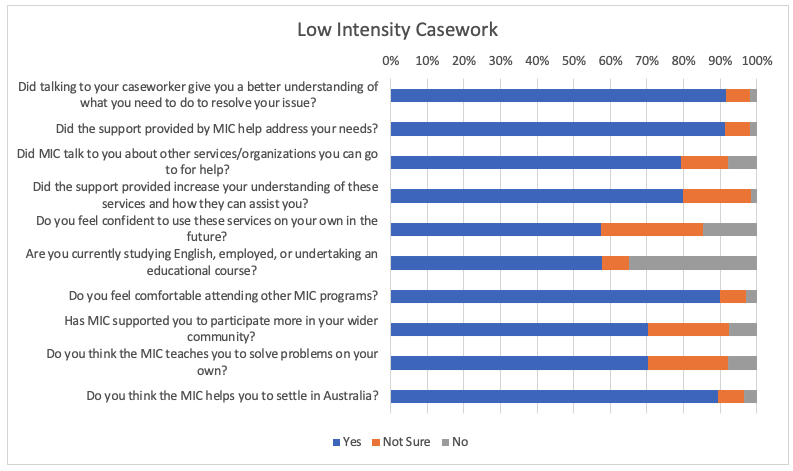
Medium Intensity Casework
Clients requiring medium-intensity casework support presented with a range of factors impacting on their settlement in Australia. Their needs that are greater and more complex requiring increased assistance and multiple sessions to be resolved. Caseworkers supporting medium intensity needs clients provided information, advice, and referrals, as well as advocacy, support and outreach as required, until the client was better able to navigate the Australian service system on their own. MIC assisted a total of 165 medium intensity clients across 828 casework sessions.
A total of 92% of clients indicated that they felt the casework support provided gave them a better understanding of what they needed to do to resolve their issues with MIC addressing the needs they raised. 87% stated they had an increased understanding of other services because of the casework support with 92% stating MIC assistance has helped them settle in Australia.
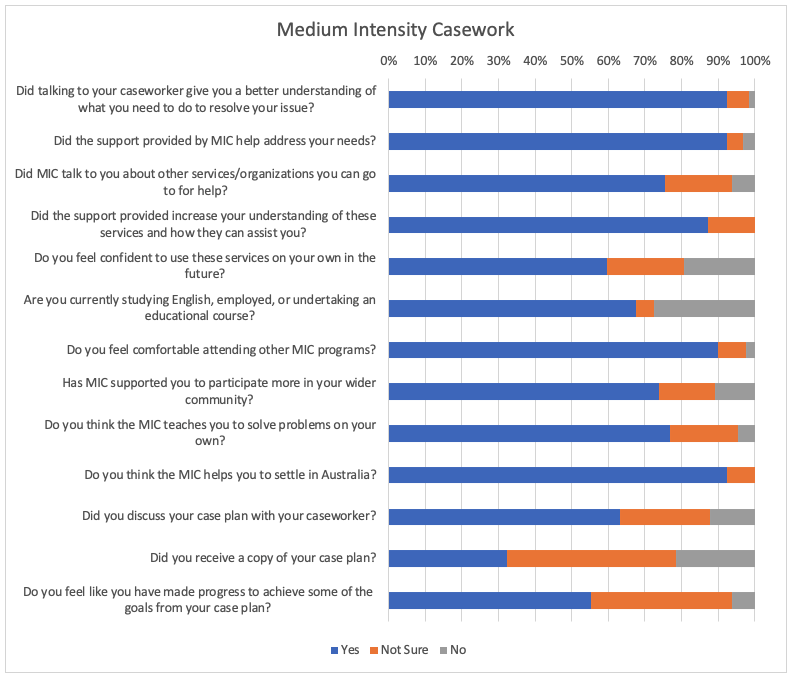
The Migrant Information Centre (Eastern Melbourne) provided settlement support for 726 clients across 2,427 sessions during the period of July 1st 2021 to June 30th 2022. Clients came from 33 different countries of birth with the graph below displaying the top countries. Within the reporting period 67% (489) of clients came from Myanmar/Burma with clients from Iran making up the second largest group of 13%. Those in the ‘other’ category had less than 3 people arriving different countries including from Somalia, Ethiopia, Sudan, and India.
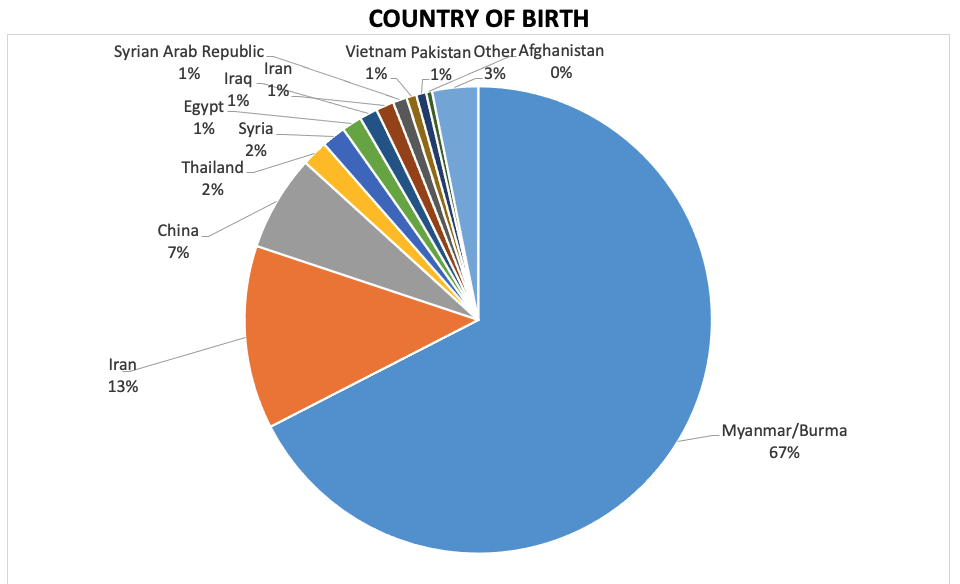 All MIC Settlement Program clients are offered the opportunity to provide feedback on the services they received from the MIC at the time of the service. In addition to this the MIC conducts a telephone survey of a number of clients who have accessed settlement services in the previous six months. Below are the results of the client survey.
All MIC Settlement Program clients are offered the opportunity to provide feedback on the services they received from the MIC at the time of the service. In addition to this the MIC conducts a telephone survey of a number of clients who have accessed settlement services in the previous six months. Below are the results of the client survey.

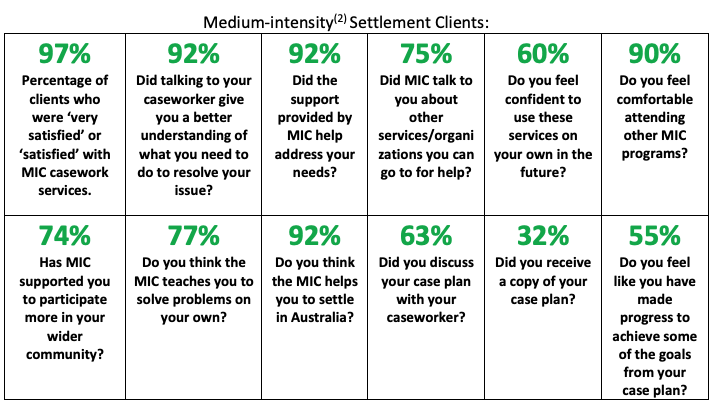
(1) Low-intensity settlement clients are clients who need short term and straight forward support to meet their goals. The SETS guidelines outlined that low-intensity casework support is provided to clients requiring minimal assistance to meet their settlement needs and achieve their goals.
(2) Medium-intensity settlement clients are clients that have greater needs that need to be addressed to assist them to meet their goals. The caseworker will work with the client to develop a case plan outlining the client’s goals and review it at 6 monthly intervals and/or as the client’s needs change. As noted in the SETS guidelines, clients requiring medium-intensity support may present with a range of factors impacting on their settlement in Australia, but are not considered to require Specialised and Intensive Services under the Humanitarian Settlement Program (HSP).
The Migrant Information Centre (Eastern Melbourne) provided settlement support for 510 clients across 1,837 sessions during the period of July 1st to December 31st 2021. Clients came from 22 different countries of birth with the graph below displaying the top countries. Within the reporting period 67% (344) of clients came from Myanmar/Burma with clients from Iran making up the second largest group of 15%. Those in the ‘other’ category had less than 3 people arriving different countries including from Pakistan, Ethiopia, Vietnam, and India.
All MIC Settlement Program clients are offered the opportunity to provide feedback on the services they received from the MIC at the time of the service. In addition to this the MIC conducts a telephone survey of a number of clients who have accessed settlement services in the previous six months. Below are the results of the client survey.
Low-intensity(1) Settlement Clients:
Medium-intensity(2) Settlement Clients:
(1) Low-intensity settlement clients are clients who need short term and straight forward support to meet their goals. The SETS guidelines outlined that low-intensity casework support is provided to clients requiring minimal assistance to meet their settlement needs and achieve their goals.
(2) Medium-intensity settlement clients are clients that have greater needs that need to be addressed to assist them to meet their goals. The caseworker will work with the client to develop a case plan outlining the client’s goals and review it at 6 monthly intervals and/or as the client’s needs change. As noted in the SETS guidelines, clients requiring medium-intensity support may present with a range of factors impacting on their settlement in Australia, but are not considered to require Specialised and Intensive Services under the Humanitarian Settlement Program (HSP).
The Migrant Information Centre (Eastern Melbourne) provided settlement support for 786 clients across 2,348 sessions during the period of July 1st to December 31st 2020. Clients came from 25 different countries of birth with the graph below displaying the top countries. Within the reporting period 61% (374) of clients came from Burma/Myanmar with clients from Iran making up the second largest group of 10%. Those in the ‘other’ category had less than 10 people arriving from India, Egypt, Malaysia, Ethiopia and Yemen.
All MIC Settlement Program clients are offered the opportunity to provide feedback on the services they received from the MIC at the time of the service. In addition to this the MIC conducts a telephone survey of a number of randomly selected clients who have accessed settlement services in the previous six months. Below are the results of the client survey.
Low-intensity(1) Settlement Clients:
Medium-intensity(2) Settlement Clients:
(1) Low-intensity settlement clients are clients who need short term and straight forward support to meet their goals. The SETS guidelines outlined that low-intensity casework support is provided to clients requiring minimal assistance to meet their settlement needs and achieve their goals.
(2) Medium-intensity settlement clients are clients that have greater needs that need to be addressed to assist them to meet their goals. The caseworker will work with the client to develop a case plan outlining the client’s goals and review it at 6 monthly intervals and/or as the client’s needs change. As noted in the SETS guidelines, clients requiring medium-intensity support may present with a range of factors impacting on their settlement in Australia, but are not considered to require Specialised and Intensive Services under the Humanitarian Settlement Program (HSP).
The Migrant Information Centre (Eastern Melbourne) provided settlement support for 894 clients across 2,791 sessions during the period of January 1st to June 30th 2019. Client’s came from 21 different countries of birth with the graph below displaying the top countries. Within the reporting period 67% of clients came from Burma with clients from Iran making up the second largest group of 11%. Those in the ‘other’ category had less than 10 people arriving from Afghanistan, Chad, Ethiopia, Greece, Hong Kong, India, Malaysia, Pakistan, and Sudan.
All MIC Settlement Program clients are offered the opportunity to provide feedback on the services they received from the MIC at the time of the service. In addition to this the MIC conducts a telephone survey of a number of randomly selected clients who have accessed settlement services in the previous six months. Below are the results of the client survey.
Settlement Program client feedback for 2017/2018
Settlements Grants Program Client Feedback July to December 2017
Settlements Grants Program Client Feedback January to June 2018
Settlement Program client feedback for 2016/2017
Settlement Grants Program Client Feedback January to June 2017
Settlement Grants Client Feedback July to December 2016
Settlement Program client feedback for 2015/2016
Settlement Grants Client Feedback January to June 2016
Settlement Grants Client Feedback July to December 2015
Feedback for our General Information sessions
General Information sessions January to June 2016
General Information session July to December 2015
Feedback for our homework groups
For Feedback on our Homework Support Programs (HSPs) in 2018/2019 see Evaluation-Report.
For Feedback on our Homework Support Programs (HSPs) in 2016/2017 see Evaluation-Report.
